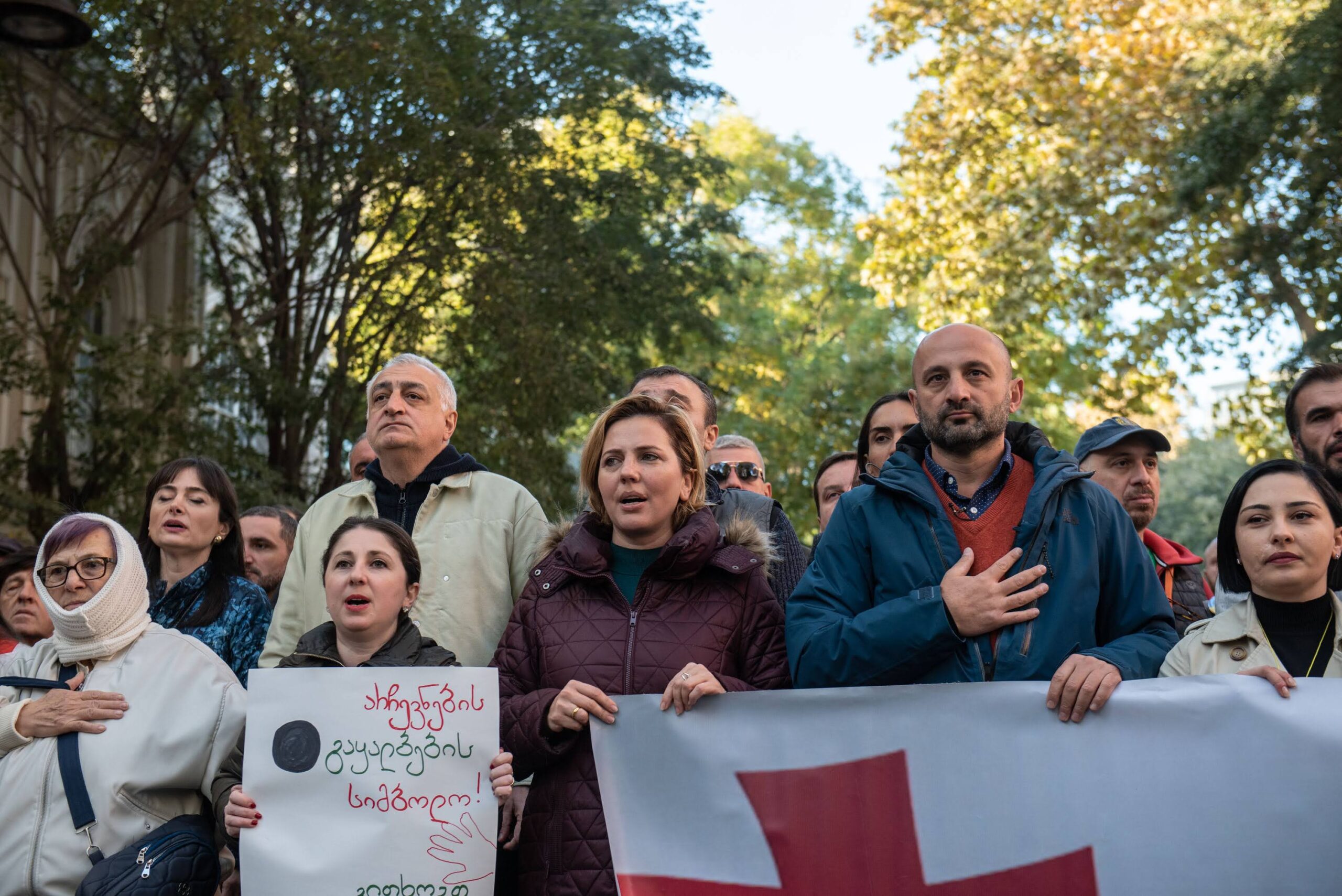
After proving victorious in an election widely seen as rigged, Georgian Dream is once again saying it wants to ban the opposition, while opposition groups seek to cripple the parliament before its inauguration.
On Monday, Georgian Prime Minister Irakli Kobakhidze warned major opposition parties that he would pursue a constitutional ban against them if they refused to accept their parliamentary mandates.
‘If they persist in acting against the constitutional order, they will essentially bring about the decision themselves,’ Kobakhidze warned.
He was evidently referring to all four opposition groups — Unity National Movement, Coalition for Change, Strong Georgia, and For Georgia — that, according to preliminary results from the 26 October vote, passed the 5% threshold, but have also denounced the election and said it was rigged by the government.
Following the elections, each has pledged not to endorse their mandates, instead demanding an investigation into election irregularities and a redo of the vote.

Banning opposition rivals was a key campaign promise for Kobakhidze and Georgian Dream in the recent parliamentary elections, but Kobakhidze’s comments during his visit to Baku for the COP29 global climate conference marked the ruling party’s first return to this idea since the 26 October vote.
[Read more: Georgian Dream names opposition parties they intend to ban]
In its campaign earlier this year, Georgian Dream called on voters to help them secure a constitutional majority — at least 113 seats in parliament — to enable them to ban its rivals. Although preliminary results indicated that the party fell short of this threshold, Kobakhidze clarified on 11 November that the party could still pursue a ban by appealing to the Constitutional Court. Under Georgian law, as few as one-fifth of all MPs, meaning just 30 lawmakers, can file an appeal to the Constitutional Court.
Georgian Dream is believed to have a reason to be confident in the country’s highest court. Before the elections, the court refused to suspend the immediate enactment of the controversial foreign agent law, and also backed Georgian Dream in 2023 by ruling that President Salome Zourabichvili breached the constitution by meeting foreign leaders without the government’s approval.
While issuing a warning to opposition groups from the COP29 conference in Baku, Kobakhidze claimed they lacked public support to push for their demands, and went on to suggest they would ‘receive the necessary instructions’ from abroad to eventually accept their parliamentary mandates.
In recent years, and especially during the latest election period, Georgian Dream has intensified its portrayal of pro-Western liberal opponents and prominent civil society groups as ‘foreign agents’ following the directives of a so-called ‘global war party’. This rhetoric, alongside the draconian foreign agent law, has brought Georgia’s already strained relations with its traditional Western partners to an unprecedented low, effectively halting the country’s path toward EU membership.
Trapped (or freed) by constitutional rules
In apparent defiance of Kobakhidze’s threat on 11 November, Unity — National Movement and Coalition for Change held separate but simultaneous press briefings, announcing that all their listed parliamentary candidates had requested the Central Election Commission (CEC) not to register them as elected parliament members.
The CEC quickly responded, asserting that they were unable to ‘de-register’ candidates or annul electoral lists.
Article 131 of Georgia’s Election Code requires the CEC to register all elected members and issue temporary certificates, after which, according to Georgia’s Constitution, a parliamentary majority would formally recognise the mandates of at least 100 elected members to effectively launch the new iteration of parliament.
Only after this can elected opposition members appeal to parliament to have their mandates revoked, while opposition parties can cancel their electoral lists entirely to prevent vacant seats from being automatically filled by the next candidates on the lists. Such measures were employed following the 2020 parliamentary elections, when some opposition lawmakers sought to revoke their mandates after Georgian Dream unilaterally inaugurated the parliament.
In 2021, a year after the elections, the ruling party blocked opposition MPs from voting themselves out of parliament — a procedural tactic that sparked protests based on the argument that a Georgian citizen cannot be compelled to hold public office against their will.
Opposition groups are now seeking to relinquish their mandates before the inauguration of parliament.
Specifically, the two major opposition groups have argued that the CEC registering them as elected lawmakers against their expressed will would violate Article 25 of the Georgian Constitution, which they claim not only grants a Georgian citizen the right to be elected to public office but, in its underlying principle, also includes the individual’s right to refuse any public position and not to be forced to assume it against their will.
Additionally, Unity — National Movement has argued that other opposition groups should adopt the same strategy, aiming to keep the number of MPs recognised by the CEC below the threshold needed to prevent Georgian Dream’s 89 elected members from formally recognising the mandates of at least 100 MPs, as required by Georgia’s Constitution to inaugurate a new parliament.
Of the two other opposition groups projected to have parliamentary representation, Strong Georgia have refused to follow the route hinting at a weak legal case, while the For Georgia party called it a ‘populist show’. Both, however, recommitted to not endorsing their parliamentary seats.
On 13 November, Kobakhidze pledged to prevent opposition ‘sabotage,’ stating that they had ‘anti-sabotage mechanisms’ to rely on, similar to those used ‘four years ago’. Although vague on specifics, in 2020-2021, Kobakhidze — who was then the parliamentary majority leader — used this term to describe his party’s tactic of blocking elected opposition members from voiding their mandates.









